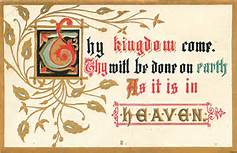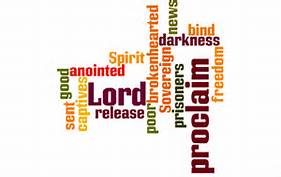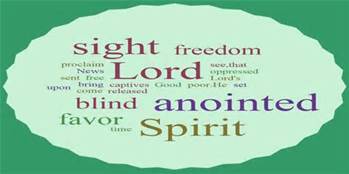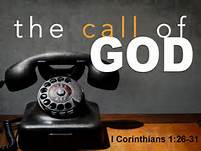“Thy Kingdom Come”

September 4, 2016 – Matthew 6:10
Here in the United States, most advertisers on Madison Avenue tell us every little girl wants to be a princess. We can see this in many cartoon movies made by Walt Disney. Princes, princesses, kings, queens. Living in a kingdom, with happily ever after figuring significantly in the ending of the stories.
When you mention “kingdom” to people, that is often the first thing they think of. But—what did Jesus mean when He talked about the term “kingdom?”
We have for our Scripture passage this morning a portion of the Lord’s Prayer from the Sermon on the Mount, Matthew 6. This is one of the most familiar portions of the Bible. A huge multitude of Christians of a vast number of denominations and faith traditions know these words by heart. I ask again: what did our Lord Jesus mean when He said these words, “Thy kingdom come, thy will be done, on earth as it is in heaven.”
To be frank, this subject of the kingdom of God is something I have struggled with for decades. Yes, I now have some understanding of what Jesus meant here in the Gospel of Matthew. And yes, I will try to help us all to understand better what it was that Jesus was saying. And, why He wanted us to say—or pray—these words.
Jesus was considered a Rabbi, a teacher, by all who knew Him. He was learned in the Hebrew Scriptures, and must have been quite skilled in rabbinic discussion and debate. That’s why I think He knew all aspects of the Old Testament understandings of the Kingdom of God.
There are several aspects of the Kingdom of God. But, important: God created the world, and everything in it. (I think God took great joy in creation, too!) By default, everything and everyone is under God’s authority and power. So, yes. Everything is part of God’s kingdom.
However, something happened after God created everything. Sin happened. A cosmic rejection, rebellion and separation from God happened. As the Apostle Paul mentions in Romans 8, the whole creation has been groaning in agony ever since.
Let’s return to Madison Avenue, and advertising. Television commercials. I can see several young, smiling people, outside. Having fun. Maybe skiing, or hiking, or sailing. “Go for all the gusto you can!” says the voiceover, on a beer commercial. These young people are on the top of their game, not a care in the world. They are not even thinking of sin, rejection, rebellion and separation from God.
I want to tell you a secret. Well, not really a secret. The fallen world and the fallen people in this world do not want to acknowledge God at all. They are separated from any idea of following God’s life, light and love. From being a part of God’s kingdom.
This is a sad reality. Jesus knows it is. That is why Jesus tells us to pray this way. “Thy kingdom come.” Yes, the whole world is separated from God. When we pray this prayer, Jesus wants us to commit to opening ourselves to God’s kingdom. We can help fulfill God’s kingdom in this world.
I found a fascinating bible study on the Lord’s Prayer online, released by the Salvation Army in Great Britain. When I examined this part of the study, it concentrated on another scripture passage from Luke 4. This section of Luke does not mention the Kingdom of God, but it might as well. This passage is where Jesus tells the people in the synagogue in His home town of Nazareth what His message is, in chapter 4. Jesus “found the place where it is written: 18 ‘The Spirit of the Lord is on me, because he has anointed me to proclaim good news to the poor. He has sent me to proclaim freedom for the prisoners and recovery of sight for the blind, to set the oppressed free, 19 to proclaim the year of the Lord’s favor.’”
This is Jesus’s Kingdom announcement! Remember, a few weeks ago, I spoke of where Jesus preaches His first sermon. It is quite a bit like political campaigns. The various candidates all try to have their position distilled down to a simple message. What they stand for. What they will strive to do. And, in both the Gospels of Matthew and of Luke, Jesus talks a lot about the Kingdom of God. What it means, and how Jesus expects to bring it. How Jesus wants His followers to bring the Kingdom themselves. Proclaim the Gospel. Share the Good News.
There are many, many commentaries, theological books, and bible studies written on this portion of Matthew, the Lord’s Prayer. The phrase we are looking at this week, “Thy kingdom come,” is considered to be a central phrase in this prayer. Some say the most important phrase. That would mean “the Kingdom announcement … is the focal point of Jesus’ entire ministry. This prayer, then, can only be understood in the light of how Jesus ‘lived the Kingdom’ while He was here on earth. Bringing the Kingdom of God to earth was Jesus’ great task.” [1]
Here is this message, this announcement of the Kingdom, again. Jesus teaches His followers to pray with a model prayer. The Lord’s Prayer. Just like Jesus does repeatedly in the Gospels when He preaches, Jesus proclaims the Kingdom in this model prayer—except He wants us to proclaim it, too! And, to do it. To bring the Kingdom in.
One thing I love about the Salvation Army: their emphasis on service, on proclaiming the Kingdom of God through concrete, hands-on means. Following their lead, we can “look at how Jesus lived His life, get involved in the things that He thought were important, and understand what Jesus meant by the term ‘Kingdom of God.’” [2] Bring relief to the poor. Visit those in jail. Heal those who are sick. Alleviate the suffering of those who are oppressed. That is what Jesus was saying in Luke 4.
With this week, we come to the end of our Summer Sermon Series from the United Church of Christ’s Statement of Mission. The last sentence of the statement: “Empowered by the Holy Spirit, we are called to discern and celebrate the present and coming reign of God.” (Or, the present and coming kingdom of God.)
God’s kingdom is here and now, and God’s kingdom is future tense. Like Jesus preached, God’s kingdom is among us, within us. We can share that kingdom with others, today. Plus, God’s kingdom is a future thing. At the end of all time, the fullness of God’s kingdom and glory will burst upon the whole world, the whole creation, in awesome majesty and glory.
What a series it has been! Each week, we have delved more deeply into each sentence of this mission statement. St. Luke’s Church was founded by this vital, missionary association of churches almost 70 years ago. Each week this summer, I hope we have discovered more about this wonderful denomination. It is my hope that we now see many connections where we can fit, and serve, and grow—as a local congregation, a fellowship of believers, and as a sister church in association with the great variety of churches in the Chicago Metropolitan Association.
God’s kingdom is here and now, and God’s kingdom is future tense, too. This is something to celebrate, like the Statement of Mission says! God is building God’s kingdom within each one of us now. It is our joy and privilege to share the Good News, to tell other people about Jesus and His love for each of us.
But, that is not all. By no means! The future part of God’s Kingdom is even better. I think most people here are familiar with George Frederick Handel and his oratorio Messiah.
The text for this chorus comes from our second reading today, from Revelation chapter 11. The Hallelujah Chorus from the end of the second part of the Handel’s oratorio Messiah says, “and He shall reign forever and ever. King of Kings, and Lord of Lords.” This is a joyous proclamation of the coming kingdom of our Lord.
Hallelujah! Hallelujah! Hallelujah!
[1]http://www.usc.salvationarmy.org/usc/prayer/24-7/24-7_UK_Bible_Studies..pdf
[2] Ibid.
(Suggestion: visit me at my regular blog for 2016: matterofprayer: A Year of Everyday Prayers. #PursuePEACE – and my other blog, A Year of Being Kind . Thanks!)






